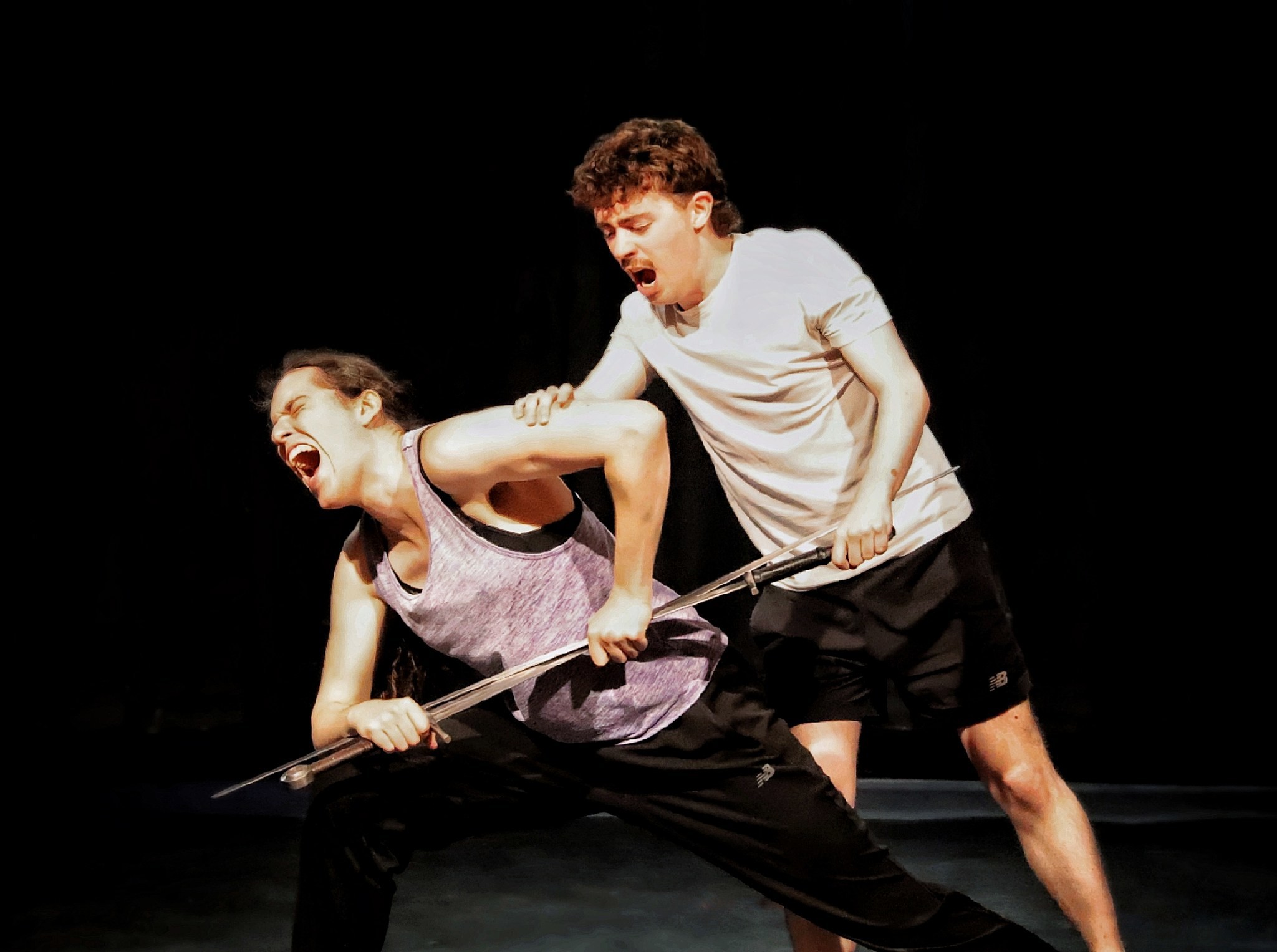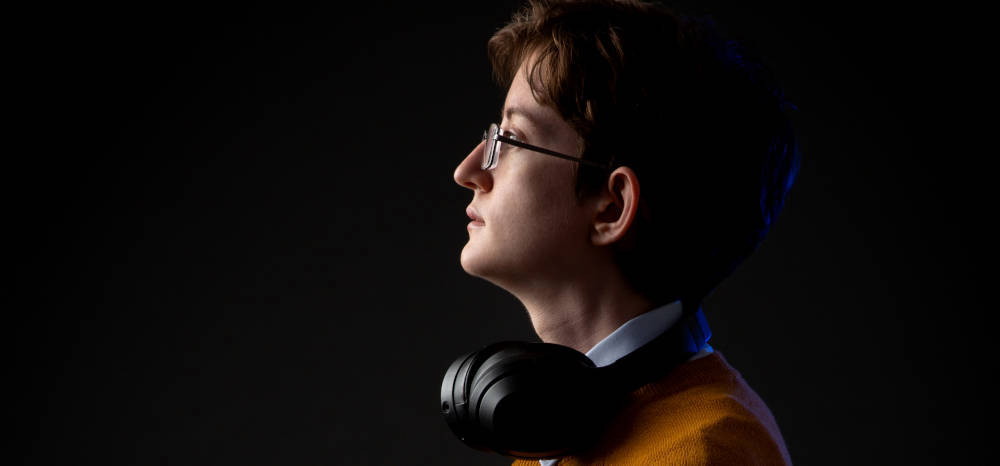The Prince by Abigail Thorn is about to launch at the Lace Market Theatre. This ambitious show stars three trans women and merges Shakespeare with the modern world. LeftLion interviews the director, Laurie Owen, on the hows and whys...

Grace Eden Photography
What made you want to direct The Prince?
So, the way that the Lace Market Theatre works is there’s a group of people who spend an entire year reading plays and discussing what would be best to show at the theatre. That group is led by an artistic director, and it's called the Play Advisory Group. The artistic director usually puts their own spin on the season, and the person who's my assistant director of the play, Micah, proposed the Prince and the PAG loved it! Our Artistic Director was really behind it and so it was put in the season. Lace Market Theatre does do some really contemporary and challenging plays; we really do a lot of shows that are not what you would expect amateur theatres to do.
We are one of the first British theatres outside of London to do ‘Waiting for Godot’, which is a modern classic, which is crazy to me! We have an archive of every play that we've ever done over the past 100 years, but I was still surprised to see The Prince on this season and I was really happy because it's a play that has three incredible parts for trans people and it’s just a really entertaining play, the script calls for a lot of sound and lighting cues that are quite interesting.
The texture of the play itself is really rich; it sort of moves between the Shakespearean and the modern text. People sometimes make the mistake that the Shakespeare is only there for set dressing when actually I think there's actually a lot of depth and a lot of thought has gone into which scenes from the original play are taken and how they're edited. There are characters who are present for certain scenes in The Prince, and they're not present for those scenes in the original plays, so a lot of interesting editorial bits are going on.
So yeah, as a play, as a text and as an opportunity to develop trans talent in Nottingham, that was what really excited me about it. And also, I have assistant directed and co-directed on a number of plays, but I've never been the sole director, and I was thinking ‘this feels like the perfect project for me to be the sole director because I can also cast it’. I can sell the play to the people who I need to audition for it, and I was pretty sure nobody else at the theatre would be able to do that in quite the way that I could. There were several people who pitched to direct The Prince, and I said, even if I don't get cast, even if I don't get director, I will still help with the casting process because I recognise I'm probably the best person to do that and I want this to be a success no matter who gets to direct it. But I was chosen to direct it so that was really cool!
I spent the year leading up to auditions promoting the idea that trans people in the city could do this kind of thing because the three trans roles are not trivial. So yeah, I want to direct it because it was a huge challenge for me, but also it was a great opportunity to develop trans talent in the city and also bring people into Lace Market Theatre.
When in fact we are just ourselves and we are the gender that we say that we are, but we come with a particular set of experiences and circumstances,
Why is trans representation in theatre is so important right now?
It's so important because there is still a widespread public misunderstanding, or just a deliberate ignorance, in the UK that trans people are just one gender pretending to be the other. When in fact we are just ourselves and we are the gender that we say that we are, but we just kind of come with a particular set of experiences and circumstances. Like, I'm a middle class, white trans man and I have a different experience of life to a white working class cis man, or a south Asian cis woman, or a black middle class non-binary person, we all come from different perspectives and the theatre is an interesting place because, ostensibly it's this place where anybody can be anything.
But I think that there are political choices constantly being made about who is acceptable to be seen on stage, and that's been the case for as long as theatre has been a cultural institution. You know, in this country, once upon a time, women were not seen on stage. It wasn't illegal for women to be on stage, that's a big misconception, but it was not socially acceptable for women to act. And so, the assumption was all plays were cast with all men, and that was just seen as completely normal. And then, we also have the assumption that black people are not seen on stage- and so we have roles like Othello that were traditionally played in blackface up until very recently. And if you go back a few decades, you get the exact same sort of arguments about ‘well white people should be allowed to play in black roles because in the theatre, anybody can be anything’ when really the theatre exists as not just a practise but alongside a kind of political landscape where certain people are acceptable to be seen in public and some are not, and we're seeing that political landscape in the UK where trans people are not being consulted on major legislative decisions that involve us.
It's all interconnected, really. And so, I did have one or two people say, ‘Oh well, surely you don't need to cast trans people as the trans parts’. And my response is no; we have to cast trans people as the trans parts because these parts for trans people almost never come up in the theatre. We're starting to see more and more plays which have trans parts written into them, we have another one coming up in the next season, but really, it's just crazy to me that there's no space for trans people in theatre. And then when these trans roles come up, there’s this assumption that we shouldn't expect to be considered for those roles either. So, it was very, very important to me that we cast trans people in the roles. I wanted to build this trust for people so they could walk into this building and be taken seriously, and we had a huge turnout at the auditions. There were people messaging me afterwards saying: ‘well, I didn't get cast. But I had such a great experience, and I want to audition for something again’! and that meant a lot to me.

Laurie Owen, director of The Prince
Kate Spencer
What makes Nottingham the best city for queer theatre?
It's an interesting question because Nottingham as a city is not the obvious choice for theatre as an industry. We have some very good theatres here, the Nottingham Playhouse, Lakeside Arts Centre, we did have Nonsuch, which was a wonderful fringe theatre which had to close, but interestingly we don't have a drama course like Leeds, Manchester, Brighton, Sheffield, London, etc. All those cities have dedicated theatre courses where you go, and you learn how to direct and produce and sort of put things together. We don't have anything like that. We have a stage design course at Nottingham Trent which is great, but we don't really have that sort of pipeline from a university course to setting up your own theatre company.
And particularly in the past couple of years, a lot of small spaces have closed-down, but there is still this really strong undercurrent and desire to make theatre in Nottingham. We have the Lace Market Theatre which is an amateur theatre with its own building that's existed for 100 years. That's really quite exceptional and very rare to come across.
Part of my background is around improv, and we have this really thriving improv scene that's existed for about 27 years. And we have little grassroots theatre companies that are all around the city such as Chronic Insanity, which is a group that produced my solo show. We also have the New Theatre at the University of Nottingham and that's the only entirely student run theatre in the whole of England. So, in terms of professional infrastructure, there's not tonnes, but the actual desire to make theatre and the people who want to make theatre are here and are doing it anyway, despite all odds. And I think queer people really thrive in are very at home in those sorts of environments.
And so in terms of trans people and non-binary people making theatre, I think that is a recent thing that has kind of grown and I've tried to champion that because I really love theatre and actually I co-teach voice workshops at Nottingham Playhouse and that's been really cool because that brought a lot of trans people into the theatre didn't even know the building existed! And then suddenly, they're coming into this theatre, and they're welcomed and they're building their confidence there. And one of the people who we cast in the Prince, I met her at one of those voice workshops for the first time.
So, I think Nottingham's not a logical place to make a theatre career; but there's such an interest and a vibrancy to make a performance.

Laurie Owen, director of The Prince
Kate Spencer
What is your favourite Shakespeare play and why?
Oh, it's tricky because I like certain ones more than others, and for certain reasons. My favourite is probably Twelvth Night. I feel it’s so basic saying that because I'm a trans man and it's a play that resonates because it has a very trans masc related story inside it, but it's just an entertaining play and it's really funny and it has these undeniable queer themes about it. I think it might have been the first Shakespeare play I ever saw.
So that's definitely my favourite, but honourable mentions are Julius Caesar and Richard the Second. Julius Caesar is always relevant, and it really gets to the point. It's got these interesting friendships and relationships between men. And this idea of mob mentality and how easily a mob can be swayed by just saying the right thing and the right sort of tone of voice at the right time.
And Richard the Second is quite a wordy play, but some of the imagery, the language, the poetry is really gorgeous. And Richard, the central character is just very hateable in a lot of ways, but also you have these moments where you can't help but feel sorry for him- it’s a very enjoyable big historical drama!
The Prince is essentially 2 characters getting trapped in the universe of the Shakespeare plays. Which Shakespeare play would you most, and least, like to be trapped in?
I would most like to be trapped in The Tempest, because I just think the land, you know, the island that they're stuck on is just so interesting. It's full of these incredible wildernesses, but there's also magic and there's fairies and it's very dangerous in a lot of ways, but it's also very
wonderful. And then if you find your place on that island, as Prospero has, you can make a place there for yourself and you're like a God of your own little universe.
The play I’d least like to get trapped in definitely Titus Andronicus, because that's the play where you've just got someone being murdered horribly every 20 minutes. It's definitely a crowd pleaser, but you don't want to be stuck in that. And also, there's no one who's very good to side with in that play. Everyone is being awful to each other and forming alliances and then breaking said alliances and it’s not a good time!
Which famous playwright’s catalogue do you think should get The Prince treatment next and why?
It's a hard question to answer because Shakespeare as a body of work has its own texture, its own feel! Maybe Arthur Miller? Chekhov would also be a good playwright to adapt- the idea of someone walking into the Uncle Vanya household and going ‘What the hell are you miserable rich people playing at!’ is quite funny to me. I'm trying to think of another playwright who has a body of work that is big enough and also enough of a texture to it, as Shakespeare has its own texture.
The thing is with Shakespeare is this type of play has been done before. One of Abigail Thorne’s biggest inspirations for The Prince is Tom Stoppard’s ‘Rosencrantz and Guildenstern Are Dead’, which is a play where there's these two characters from Hamlet who show up in a handful of scenes and have a handful of lines between them. They're two of Hamlet's friends from university, and this play shows what they're getting up to, the conversations they're having whilst ‘Hamlet’ is going on in the next room. And it also has these meta elements where there are these points where they start to understand that they're in a play and that the two of them are stuck in this void space while things happen around them. Every so often they have a line or two to contribute and then they go back to being in the void space. I would say it’s less accessible than The Prince, but it’s brilliant in its own right. If you enjoyed the Prince I would say have a look at that play, there's a film adaptation of it with Gary Oldman.
The Prince runs at the Lace Market Theatre from Monday 21 July to Saturday 26 July 2025.
We have a favour to ask
LeftLion is Nottingham’s meeting point for information about what’s going on in our city, from the established organisations to the grassroots. We want to keep what we do free to all to access, but increasingly we are relying on revenue from our readers to continue. Can you spare a few quid each month to support us?




